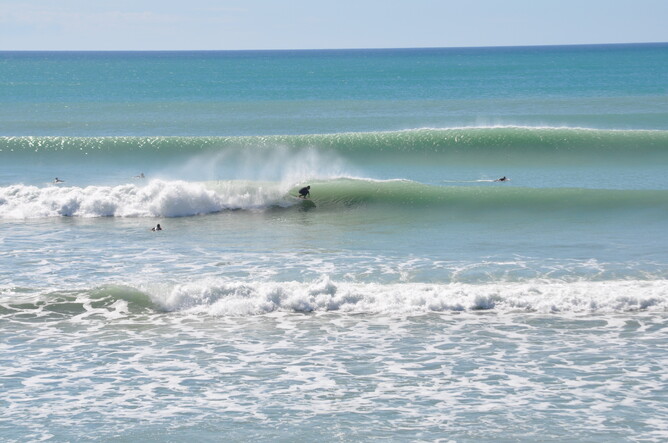eCoast to study New Zealand surf breaks
Raglan-based eCoast Marine Consulting and Research has been awarded a major research grant to study New Zealand's famous surf breaks.
As part of a consortium led by the University of Waikato, funding was awarded from New Zealand's Ministry of Business Innovation and Employment as part of its 2015 Science Investment programme.
The three-year project entitled 'Remote Sensing, Classification and Management Guidelines for Surf Breaks of National and Regional Significance' will gather baseline data on seven of New Zealand's most iconic surf breaks. This includes remote camera imagery, underwater topography, wind and wave conditions, and detailed user information.
This data will then be used to create detailed description of how the surfbreaks work from both a physical and scientific viewpoint as well as from a social and cultural perspective. Ultimately, the results of the study is to support of New Zealand's Coastal Policy Statement, which calls for the protection of New Zealand's Surfbreaks of National Significance.
eCoast director and University of Waikato PhD candidate Ed Atkin says the project is ground breaking and a world first.
"New Zealand is the only country in the world to recognise in legislation the importance of surf breaks as important social and economic resources that should be protected. Yet there is essentially no baseline quantitative information on which to base any management decisions. This project will change that and serve as a model for others to follow in terms of surf break protection and the protection of recreational resources in general," Atkin says.
Surf breaks to be studied include Piha Beach near Auckland, Raglan's famed left hander at Manu Bay, 'The Bar' at Whangamata, 'Pines' at Gisborne's Wainui Beach, Lyall Bay in Wellington, and Aramoana and Whareakeake (also known as Murdering Bay) near Dunedin.
eCoast managing director Dr Shaw Mead says each of the surf breaks is either world famous or important to the local community as a recreational resource.
"Several of these breaks have been the subject of contentious debate resulting from developmental pressure. This research will help community members and decision makers to be better informed about what is really important with regards to how surf breaks work," he adds.
eCoast Marine Consulting and Research is a small, independent marine and freshwater research consultancy based in Raglan on the west coast of New Zealand's North Island. As well as being life-long and passionate surfers and ocean enthusiasts, the company's directors and employees all hold PhDs or other postgraduate qualifications in coastal science, oceanography, engineering, marine biology and mathematics. The group strives to be a world leader in sustainable coastal development and science based decision making in the coastal zone.
As part of a consortium led by the University of Waikato, funding was awarded from New Zealand's Ministry of Business Innovation and Employment as part of its 2015 Science Investment programme.
The three-year project entitled 'Remote Sensing, Classification and Management Guidelines for Surf Breaks of National and Regional Significance' will gather baseline data on seven of New Zealand's most iconic surf breaks. This includes remote camera imagery, underwater topography, wind and wave conditions, and detailed user information.
This data will then be used to create detailed description of how the surfbreaks work from both a physical and scientific viewpoint as well as from a social and cultural perspective. Ultimately, the results of the study is to support of New Zealand's Coastal Policy Statement, which calls for the protection of New Zealand's Surfbreaks of National Significance.
eCoast director and University of Waikato PhD candidate Ed Atkin says the project is ground breaking and a world first.
"New Zealand is the only country in the world to recognise in legislation the importance of surf breaks as important social and economic resources that should be protected. Yet there is essentially no baseline quantitative information on which to base any management decisions. This project will change that and serve as a model for others to follow in terms of surf break protection and the protection of recreational resources in general," Atkin says.
Surf breaks to be studied include Piha Beach near Auckland, Raglan's famed left hander at Manu Bay, 'The Bar' at Whangamata, 'Pines' at Gisborne's Wainui Beach, Lyall Bay in Wellington, and Aramoana and Whareakeake (also known as Murdering Bay) near Dunedin.
eCoast managing director Dr Shaw Mead says each of the surf breaks is either world famous or important to the local community as a recreational resource.
"Several of these breaks have been the subject of contentious debate resulting from developmental pressure. This research will help community members and decision makers to be better informed about what is really important with regards to how surf breaks work," he adds.
eCoast Marine Consulting and Research is a small, independent marine and freshwater research consultancy based in Raglan on the west coast of New Zealand's North Island. As well as being life-long and passionate surfers and ocean enthusiasts, the company's directors and employees all hold PhDs or other postgraduate qualifications in coastal science, oceanography, engineering, marine biology and mathematics. The group strives to be a world leader in sustainable coastal development and science based decision making in the coastal zone.
